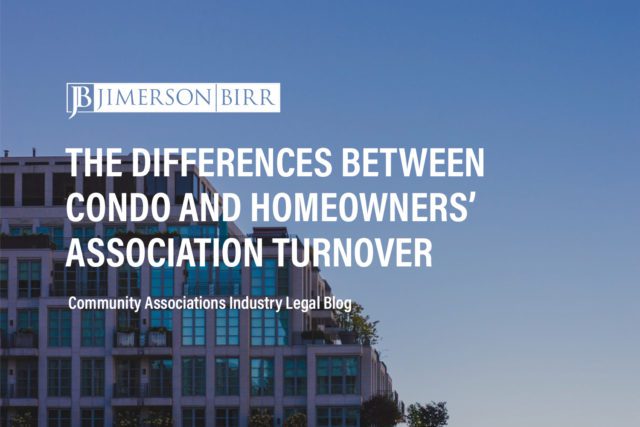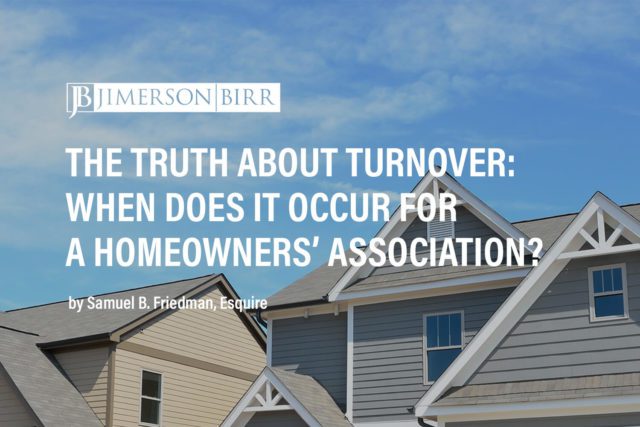How does developer turnover affect community associations?
Developer turnover involves the transition of control of a community association from the developer to the homeowners or unit owners. This process requires compliance with various laws and procedures to ensure a smooth transition.
Engaging legal counsel to provide developer turnover guidance helps ensure that community associations are equipped with the necessary tools and resources to manage their affairs independently after the developer relinquishes control. This includes establishing proper governance structures, financial management protocols, and operational procedures tailored to the needs of the community.
Moreover, through developer turnover guidance, community associations can ensure legal compliance and minimize the likelihood of disputes, financial instability, and operational inefficiencies.
Need help regarding developer turnover guidance and compliance? Schedule your consultation today with a top community associations attorney.
In Florida, which laws and regulations apply to developer turnover?
In Florida, several laws and regulations apply to developer turnover, including:
- Florida’s Condominium Act: Outlines the requirements for developer turnover in condominium associations, including the turnover of financial records and association control, and sometimes including a turnover inspection report.
- Florida’s Homeowners’ Association Act: Details the requirements for developer turnover in homeowners’ associations, including the turnover of financial records and association control.
- Florida’s Cooperative Act: Provides the requirements for developer turnover in cooperative associations, including the turnover of financial records and association control, and sometimes including a turnover inspection report.
What are common issues regarding developer turnover that lead to litigation?
The following issues are among the most common in actions regarding developer turnover:
- Incomplete or Inadequate Documentation: Failure to maintain thorough documentation during the turnover process can lead to disputes over responsibilities, financial matters, and governance structure, potentially resulting in litigation.
- Delayed Turnover: Delays in transferring control can lead to frustration among homeowners or unit owners, prompting legal action to expedite the process.
- Breach of Fiduciary Duty: Allegations of mismanagement or conflicts of interest during the developer-controlled period may result in claims of breach of fiduciary duty, leading to litigation to recover damages or seek accountability.
- Deficient Financial Management: Issues such as the commingling of funds, improper accounting practices, or failure to adequately fund reserves can lead to financial instability within the community association, triggering litigation to address financial discrepancies or recover losses.
We are value-based attorneys at Jimerson Birr, which means we look at each action with our clients from the point of view of costs and benefits while reducing liability. Then, based on our client’s objectives, we chart a path to seek appropriate remedies.
To determine whether your unique situation may necessitate litigation, please contact our office to set up your initial consultation.
What steps should businesses take to minimize the risk of litigation over developer turnover?
To minimize the risk of litigation over developer turnover, businesses can implement the following strategies:
- Comprehensive Documentation: Maintain detailed records throughout the turnover process, including financial statements, correspondence, and governing documents, to ensure transparency and accountability.
- Timely Turnover: Adhere to statutory deadlines and contractual obligations for transferring control, minimizing delays and potential disputes.
- Diligent Financial Management: Establish robust financial controls, separate bank accounts, and reserve funds in accordance with statutory requirements to mitigate the risk of financial mismanagement and disputes.
- Clear Communication: Maintain open lines of communication with homeowners or unit owners, providing regular updates on the turnover process, responsibilities, and expectations to foster trust and cooperation.
- Legal Review: Seek guidance from experienced legal counsel specializing in community association law to navigate complex legal requirements, identify potential risks, and mitigate liability.
- Proactive Conflict Resolution: Address conflicts or disputes promptly through negotiation or alternative dispute resolution methods to avoid costly and time-consuming litigation.
Frequently Asked Questions
Can a developer be held liable for issues that arise after turnover?
Yes, a developer can sometimes be held liable for issues that arise after turnover if the developer failed to fulfill its obligations or if there are defects or deficiencies in the construction or management of the community. However, liability will depend on the specifics of the case and whether the developer’s actions or omissions contributed to the issues.
How long does the developer-controlled period typically last in Florida community associations?
The duration of the developer-controlled period can vary depending on factors such as the type of community association and the provisions outlined in the governing documents. In Florida, developer-controlled periods commonly last until a certain percentage of the parcels have been conveyed to members other than the developer or until a specified timeframe elapses, as stipulated by law or the association’s governing documents.
What legal obligations does a developer have during the turnover process?
Generally, developers’ legal obligations during the turnover process include providing financial records, governance documents, and necessary infrastructure to the community association. Developers must also help ensure a smooth transition of control by complying with statutory requirements and deadlines and addressing any outstanding issues or defects in the property.
Have more questions about a situation related to developer turnover?
Crucially, this overview of developer turnover does not begin to cover all the laws implicated by this issue or the factors that may compel the application of such laws. Every case is unique, and the laws can produce different outcomes depending on the individual circumstances.
Jimerson Birr attorneys guide our clients to help make informed decisions while ensuring their rights are respected and protected. Our lawyers are highly trained and experienced in the nuances of the law, so they can accurately interpret statutes and case law and holistically prepare individuals or companies for their legal endeavors. Through this intense personal investment and advocacy, our lawyers will help resolve the issue’s complicated legal problems efficiently and effectively.
Having a Jimerson Birr attorney on your side means securing a team of seasoned, multi-dimensional, cross-functional legal professionals. Whether it is a transaction, an operational issue, a regulatory challenge, or a contested legal predicament that may require court intervention, we remain tireless advocates at every step. Being a value-added law firm means putting the client at the forefront of everything we do. We use our experience to help our clients navigate even the most complex problems and come out the other side triumphant.
If you want to understand your case, the merits of your claim or defense, potential monetary awards, or the amount of exposure you face, you should speak with a qualified Jimerson Birr lawyer. Our experienced team of attorneys is here to help. Call Jimerson Birr at (904) 389-0050 or use the contact form to schedule a consultation.

We live by our 7 Superior Service Commitments
- Conferring Client-Defined Value
- Efficient and Cost-Effective
- Accessibility
- Delivering an Experience While Delivering Results
- Meaningful and Enduring Partnership
- Exceptional Communication Based Upon Listening
- Accountability to Goals











